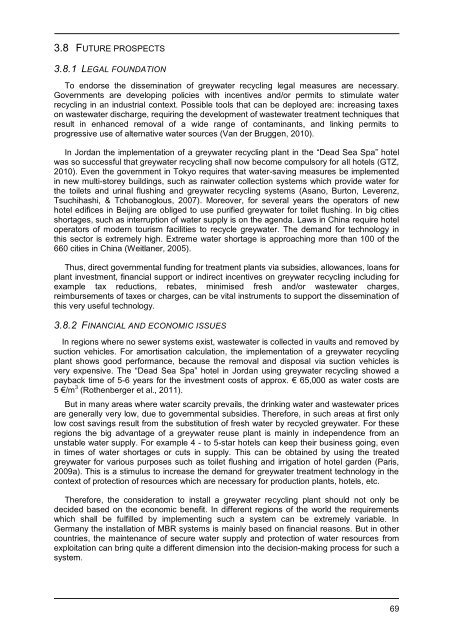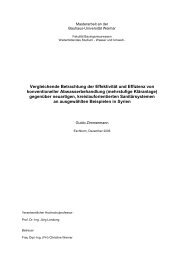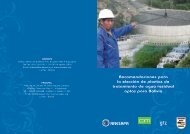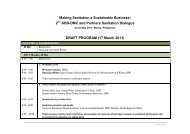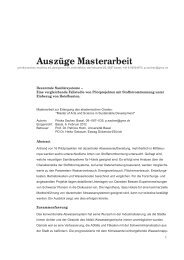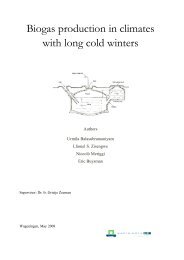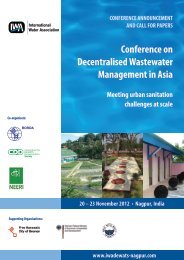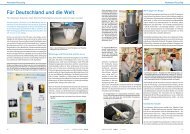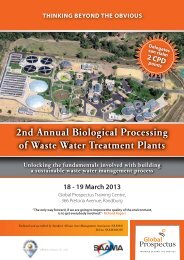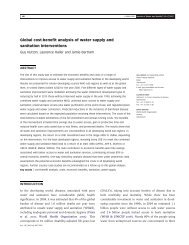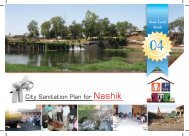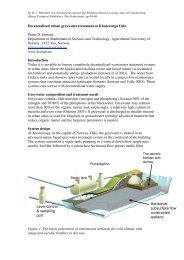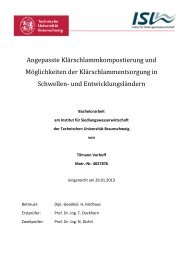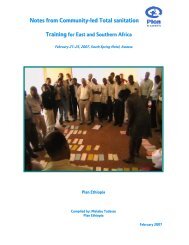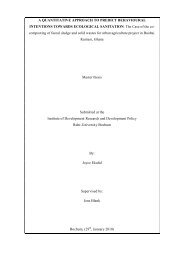An innovative greywater treatment system for urban areas ... - SuSanA
An innovative greywater treatment system for urban areas ... - SuSanA
An innovative greywater treatment system for urban areas ... - SuSanA
Create successful ePaper yourself
Turn your PDF publications into a flip-book with our unique Google optimized e-Paper software.
3.8 FUTURE PROSPECTS<br />
3.8.1 LEGAL FOUNDATION<br />
To endorse the dissemination of <strong>greywater</strong> recycling legal measures are necessary.<br />
Governments are developing policies with incentives and/or permits to stimulate water<br />
recycling in an industrial context. Possible tools that can be deployed are: increasing taxes<br />
on wastewater discharge, requiring the development of wastewater <strong>treatment</strong> techniques that<br />
result in enhanced removal of a wide range of contaminants, and linking permits to<br />
progressive use of alternative water sources (Van der Bruggen, 2010).<br />
In Jordan the implementation of a <strong>greywater</strong> recycling plant in the “Dead Sea Spa” hotel<br />
was so successful that <strong>greywater</strong> recycling shall now become compulsory <strong>for</strong> all hotels (GTZ,<br />
2010). Even the government in Tokyo requires that water-saving measures be implemented<br />
in new multi-storey buildings, such as rainwater collection <strong>system</strong>s which provide water <strong>for</strong><br />
the toilets and urinal flushing and <strong>greywater</strong> recycling <strong>system</strong>s (Asano, Burton, Leverenz,<br />
Tsuchihashi, & Tchobanoglous, 2007). Moreover, <strong>for</strong> several years the operators of new<br />
hotel edifices in Beijing are obliged to use purified <strong>greywater</strong> <strong>for</strong> toilet flushing. In big cities<br />
shortages, such as interruption of water supply is on the agenda. Laws in China require hotel<br />
operators of modern tourism facilities to recycle <strong>greywater</strong>. The demand <strong>for</strong> technology in<br />
this sector is extremely high. Extreme water shortage is approaching more than 100 of the<br />
660 cities in China (Weitlaner, 2005).<br />
Thus, direct governmental funding <strong>for</strong> <strong>treatment</strong> plants via subsidies, allowances, loans <strong>for</strong><br />
plant investment, financial support or indirect incentives on <strong>greywater</strong> recycling including <strong>for</strong><br />
example tax reductions, rebates, minimised fresh and/or wastewater charges,<br />
reimbursements of taxes or charges, can be vital instruments to support the dissemination of<br />
this very useful technology.<br />
3.8.2 FINANCIAL AND ECONOMIC ISSUES<br />
In regions where no sewer <strong>system</strong>s exist, wastewater is collected in vaults and removed by<br />
suction vehicles. For amortisation calculation, the implementation of a <strong>greywater</strong> recycling<br />
plant shows good per<strong>for</strong>mance, because the removal and disposal via suction vehicles is<br />
very expensive. The “Dead Sea Spa” hotel in Jordan using <strong>greywater</strong> recycling showed a<br />
payback time of 5-6 years <strong>for</strong> the investment costs of approx. € 65,000 as water costs are<br />
5 €/m 3 (Rothenberger et al., 2011).<br />
But in many <strong>areas</strong> where water scarcity prevails, the drinking water and wastewater prices<br />
are generally very low, due to governmental subsidies. There<strong>for</strong>e, in such <strong>areas</strong> at first only<br />
low cost savings result from the substitution of fresh water by recycled <strong>greywater</strong>. For these<br />
regions the big advantage of a <strong>greywater</strong> reuse plant is mainly in independence from an<br />
unstable water supply. For example 4 - to 5-star hotels can keep their business going, even<br />
in times of water shortages or cuts in supply. This can be obtained by using the treated<br />
<strong>greywater</strong> <strong>for</strong> various purposes such as toilet flushing and irrigation of hotel garden (Paris,<br />
2009a). This is a stimulus to increase the demand <strong>for</strong> <strong>greywater</strong> <strong>treatment</strong> technology in the<br />
context of protection of resources which are necessary <strong>for</strong> production plants, hotels, etc.<br />
There<strong>for</strong>e, the consideration to install a <strong>greywater</strong> recycling plant should not only be<br />
decided based on the economic benefit. In different regions of the world the requirements<br />
which shall be fulfilled by implementing such a <strong>system</strong> can be extremely variable. In<br />
Germany the installation of MBR <strong>system</strong>s is mainly based on financial reasons. But in other<br />
countries, the maintenance of secure water supply and protection of water resources from<br />
exploitation can bring quite a different dimension into the decision-making process <strong>for</strong> such a<br />
<strong>system</strong>.<br />
69


